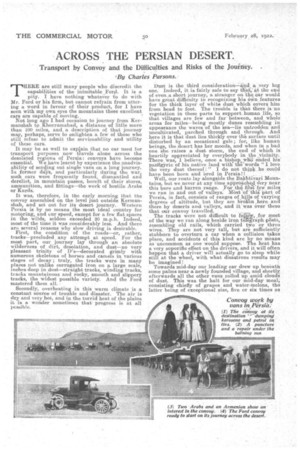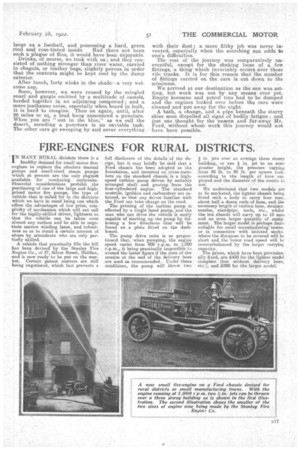ACROSS THE PERSIAN DESERT.
Page 20

Page 21

If you've noticed an error in this article please click here to report it so we can fix it.
Transport by Convoy and the Difficulties and Risks of the Journey, • 'By Charles Parsons.
THERE are still many people who discredit the capabilities of the inimitable Fora. It is a pity. I have nothing whatever to do with Mr. Ford or his firm, but cannot refrain from uttering a word in favour of their product, for I have seen with my own eyes the mountains these excellent
cars are capable of moving, ' Not long ago I had occasion to journey from Kermanshah to Khorramabad, a distance of Mile more than 100 miles, a.nd a description of that journey may, perhaps, serve to enlighten a few of those who still refuse to admit the serviceability and utility of these cars.
It may be as well to explai1 that no car used for transport purposes now travels alone across the desolated regions of Persia: convoys have become essential. We have learnt by experience the unathisability of sending out single vans on a long journey. In former dais, and particularly during the war, such ears were frequently found dismantled and derelict, in mountain passes, bereft of their stores, ammunition, and fittings—the work of hostile Arabs or Kurds.
It was, therefore, in the early morning that the convoy assembled on the level just outside Kermanshah and set out for its desert journey. Western, Persia is by no means the most ideal country for motoring, and our speed, except for a few flat spaces in elle wilds, seldom exceeded 20 m.p.h. Indeed, most of the time it wp.s considerably less. And there are several reasons why slow driving is desirable.
First, the condition of the roads—or, rather, tracks—precluded any attempt at speed. For the most part, our journey lay through an. absolute wilderness of dirt, desolation, and dust—no very pleasant trinity of D's—decorated grimly with numerous skeletons of horses and camels in various stages of decay ; truly, the tracks were in many places not unlike corrugated iron on a large scale, inches deep in dust—straight tracks, winding tracks, tracks mountainous and rocky, smooth and slippery tracks, the widest possible variety. And the Ford mastered them all. •
Secondly, overheating in this warm climate is a constant source of trouble and disaster. The air is dry and very hot, and in the torrid heat of the plains it is a wonder sometimes that progress is at all possible. Dust is the third consideration-kod. a ,very big one. Indeed, it is fairly safe to say that, at the end of even,a short journey, a stranger on tbe car would have great difficulty in recognizing his own features for the thick layer of white dust which covers him from head to foot. The trouble is that there is no vegetation in these parts to support.human life, so that villages are few and far between, and whole areas for miles—being mostly dunes resembling in appearance the waves of the sea—lie untrodden and uncultivated, parched through and through. And here it is that dust lies thickly over the surface until disturbed by an occasional gale ; for, like human beings, the desert has her moods, and when in a bad one she raises a dust storm, the end of which is heartily appreciated by everybody in the vicinity. There was, I believe, once a bishop.,71f6 ended his pargg-jrrie of his native land with the words "I love the very dust thereof !" I do not think he eould have been born and bred in Persia!! , Well, our route lay alongside the Bakhtivari Mountains, but we never at any time aPProirched -kry near, this bare and barren range. For the; filf;rfew miles we ran in and out of valleys: Most of `thii Part of Persia, in fact, consists of ranges of hills of varying degrees of altitude, but they are broken ,here and .there by deserts and valleys, and it'was over these that our convoy travelled. The tracks were not difficult to fo. for most of the way we ran along beside iron telegraph pftsts, resembling old rails, which carried two or three wires. They are not very tall, but are sufficiently stubborn to overturn a car when a collision takes place, and accidents of this kind are by no means as uncommon as one would suppose. The heat has a very soporific effect on the drivers, and it will often happen that a driver will actually go to sleep while still at the wheel, with what disastrous results may be imagined!
Towards mid-day our leading car drew up beneath some palms near -a newly founded village, and shortly afterwards all the other vans rolled up amid clouds of dust. This was the halt for our mid-day meal, consisting chiefly of grapes and water-melons, the latter being of exceptional size, five or six times as large as a football, and possessing a hard, green rind and rose-tinted inside. Had there not been such a plague of flies, it would have been enjoyable. Drinks, of course, we took with us; and they consisted of nothing stronger than river water, carried in chaguls, or loather bags, slightly porous in order that the contents might be kept cool by the damp exterior.
After lunch, forty winks in the shade—a very welcome nap.
Boon, .however, we were roused by the mingled snarl and gurgle emitted by a multitude of camels, herded together in an adjoining compound; and a more loathsome noise, especially when heard in bulk, it is hara to imagine. Then on again, until, after 20 miles or so, a loud bang announced a puncture. When you arc "out in the blue," as we call the desert, mending a puncture is no enviable task. The other cars go sweeping by and cover everything with their dust ; a more filthy job was never invented, especially when the scorching sun adds to one's difficulties. •
The rest of the journey was comparatively uneventful, except for the shaking loose of a few fittings, a thing which invariably occurs over these vile tracks. It is for this reason that the number of fittings carried on the cars is .cut down to the minimum.
We arrived at our destination as the sun was setting, but work was not by any means over yet. Empty kerosene and petrol tins had to be dumped and the engines looked over before the cars were cleaned and put away for the night.
A bath, a change, and a pipe beneath the starry skies soon dispelled all signs of bodily fatigue ; and just one thought for the unseen and far-away Mr. Ford, without whose work this journey would not have been possible.






























